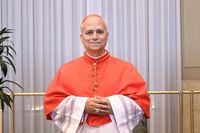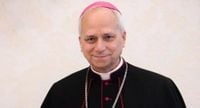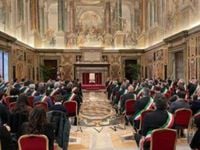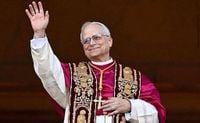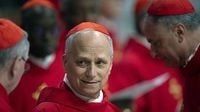On Thursday, May 8, 2025, the Sistine Chapel signaled the election of a new Pope, marking a historic moment for the Catholic Church. Cardinal Robert Francis Prevost, an American, was proclaimed Pope Leone XIV, becoming the first U.S.-born pontiff in history. The announcement came after a swift conclave that lasted just two days, reflecting a desire for continuity following the transformative papacy of Pope Francis, who passed away only 17 days earlier.
The conclave, which began on Wednesday, May 7, involved 133 cardinal electors and concluded with the appearance of white smoke at 17:43 local time, signaling that a decision had been reached. This rapid election surprised many observers who anticipated a longer deliberation given the diversity of candidates and the complexities of the Church's current challenges.
As the news spread, approximately 45,000 people gathered in St. Peter's Square, a sea of faces from over 30 countries, eagerly awaiting the revelation of the new leader of over 1.3 billion Catholics worldwide. When white smoke billowed from the chapel, the crowd erupted in applause, capturing a moment that would be etched in history. Cardinal Dominique Mamberti delivered the announcement in Latin, declaring, "Habemus Papam," followed by the name of the new pope.
Pope Leone XIV, born on September 14, 1955, in Chicago, Illinois, has had a rich and varied career within the Church. He was ordained a priest in 1982 and served as bishop of Chiclayo, Peru, from 2014 to 2021. His experience in Latin America, particularly in impoverished communities, has shaped his pastoral approach and commitment to social justice. Before his election, he held the position of Prefect of the Dicastery for Bishops, a role in which he managed numerous episcopal appointments and was instrumental in fostering a new generation of church leaders.
Following his election, Pope Leone XIV expressed his commitment to dialogue and peace, echoing the sentiments of his predecessor. Matteo Bruni, director of the Holy See Press Office, emphasized the significance of the new pope's name, which pays homage to Leo XIII, known for his encyclical Rerum novarum that laid the foundation for modern Catholic social teaching. Bruni noted that the new pope's focus on dialogue is particularly relevant in a world often marked by conflict.
Despite his impressive credentials, Prevost's rise to the papacy has not been without controversy. He has faced allegations of covering up sexual abuse cases involving priests he worked with in both the United States and Peru. The Diocese of Chicago has acknowledged its responsibility in these matters, offering apologies and compensation to victims. Prevost has firmly denied any wrongdoing, and the accusations have sparked significant debate within the Church.
The conclave itself was marked by a sense of urgency, with the first scrutiny on Wednesday resulting in black smoke, indicating no consensus had been reached. The second scrutiny on Thursday morning similarly yielded no results, but by the fifth vote that afternoon, the white smoke signaled a breakthrough. This efficiency in decision-making suggests a united front among the cardinal electors, who prioritized continuity with Pope Francis's vision.
Pope Leone XIV's election reflects broader trends within the Church, including the growing influence of Catholicism in the Americas, particularly as the Church faces challenges in maintaining its presence in Europe and North America. The new pope's background and fluency in Spanish, Italian, and English position him well to connect with diverse congregations across the globe.
As he steps into his new role, Pope Leone XIV is expected to focus on several key priorities, including strengthening evangelization efforts in regions experiencing a decline in Catholic membership, promoting interreligious dialogue, and addressing pressing issues such as climate change. His commitment to these causes aligns with the legacy of his predecessor, who championed social justice and environmental stewardship.
In the immediate aftermath of his election, the new pope will celebrate a Mass with the cardinals in the Sistine Chapel on Friday, May 9, 2025, marking his first public appearance as pontiff. This event will be broadcast live, allowing millions to witness the new leader's message of hope and unity.
Looking ahead, Pope Leone XIV's agenda will likely include appointing new leaders for various dicasteries and commissions within the Vatican, ensuring that his administration reflects both continuity and the need for reform. Observers anticipate he will retain key figures close to Pope Francis in order to maintain the momentum of the reforms initiated during the previous papacy.
The election of an American pope is a significant milestone, particularly in light of the growing competition from evangelical churches and secularism in the United States. World leaders have quickly sent congratulatory messages, highlighting the potential for enhanced global diplomacy through a papacy rooted in American values.
As the Catholic Church navigates the complexities of modernity, Pope Leone XIV's leadership will be crucial in addressing the internal divisions that have emerged between progressive and conservative factions. His ability to mediate these tensions will be essential for fostering unity within the Church and advancing its mission in a rapidly changing world.
In summary, the election of Pope Leone XIV marks a pivotal moment in Catholic history, characterized by both hope and challenge. As he embarks on his papacy, the new pope will carry the weight of expectations from a diverse global congregation, eager for guidance and inspiration in a time of uncertainty.
